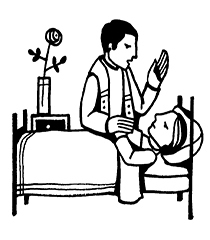 From a reader…
From a reader…
QUAERITUR:
My wife is pregnant and the baby is not doing so well (has a cystic hygroma and some heart issues – if you can pray for her, her name is Angela Fatima)…my question is a priest that we know wants to do the “anointing of the sick sacrament” on my wife. Is this ok? My wife is not in danger of anything. The baby may or may not make, but not sure if it’s ok for her to receive this sacrament. Let me know what you think.
First, I am very sorry for your worrisome situation. I’m sure people here will pray for you all.
We have to make some distinctions about who may receive the Sacrament of Anointing.
There are two people involved here, your wife and your unborn child.
The Sacrament of Anointing for those who are in danger of death. Pregnancy is not an illness, but rather a natural condition. If your wife is not in danger of death, she is not to be given the Sacrament.
Your unborn child does seem to be at risk. However, only those who have acquired the use of reason can receive the Sacrament of Anointing. Children are not give this sacrament unless they have attained the use of reason (can. 1004).
The primary purpose of the Sacrament of Anointing is to heal the soul, strengthen it for the trial and risk of death, and to arouse in the soul the love of God. A secondary effect can be physical healing. In the case that a person has unconfessed mortal sins, if the person is incapable of making a confession, the Sacrament of Anointing can remit sins. While an unborn child is a member of the human race, and therefore subject to Original Sin, the baby has committed no actual sins. This is another reason why children not given this sacrament. As the Council of Trent says: “[A]ll those who have not the use of reason are not fit subjects for this Sacrament; and likewise children who, having committed no sins, do not need the Sacrament as a remedy against the remains of sin.”
You definitely want to ask your priest for blessings for them both. There is a beautiful blessing in the traditional Rituale Romanum for women before childbirth.
I hope and pray that all goes well.


































Father Z, would you possibly address the issue of in utero Baptism? (And how that might discretely be accomplish). I had once heard, while still in the seminary, that Pius XII (?) allowed this using a saline solution. This has been in the back of mind for years for such situations as described here. Thank you Father.
Father can you list the prayer for BEFORE childbirth? I keep finding thevone on the Churching of Women AFTER childbirth.
That would be the
Benedictio mulieris praegnantis in periculis partus. Blessing of an Expectant Mother at the approach of confinement.
My prayers for the reader and his wife and child. May God provide them with every Grace.
I have a slightly related question. I have often wondered about Baptism of Desire. In a normal Baptism, the godparents supply the Faith the infant needs in order to receive the Sacrament, it being incapable of reasoning. In a Baptism of Desire, the hope and desire of the catechuman to soon receive baptism, combined with his Faith, is sufficient to provide the grace of the sacrament in lieu of the actual Baptismal water.
Is there any theological school of thought regarding the possibility of a parent (or godparent) providing both the Faith and Hope for an unborn child in extremis such that the child receives the benefit of the sacrament? I trust all things to God’s mercy, and make no presumptions one way or the other on the souls of children, born or unborn, baptized or unbaptized, although I am a firm believer in the doctrine of Original Sin, as are all faithful Catholics. However, logically speaking, I never understood why this particular scenario/question had not been explored (at least not back when I was studying such things).